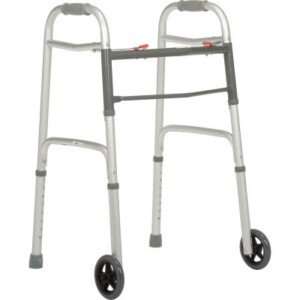
If you have inflammation that impairs walking, you might be wondering if using a walker can reduce the so-called inflammatory chemical mediators, such as those present with a herniated disc or sciatica.
The Effect of Using a Walker on Sciatica
“A walker is not prescribed to diminish inflammation,” says Dr. Michael Perry, MD, member of the North American Spine Society and American College of Sports Medicine.
He continues, “Walkers are used for patients who need assistance with walking to provide stability and prevent further injury from falling.
“A walker can help alleviate pressure on the spine and help diminish pain; however, other than short term relief, they are not prescribed to assist with inflammation.”
So if you have low back pain from spinal stenosis — which is completely different from sciatica — a walker will help relieve pain by subtracting pressure off your low back.
It’s not a treatment; it’s only a pain reliever by altering the mechanics of your walking.
Using a walker significantly alters body mechanics by shifting weight distribution and changing gait patterns.
For spinal stenosis and other conditions, it provides external support, allowing users to offload weight from the lower limbs, which reduces stress on hips, knees and ankles.
Walkers promote a wider base of support, improving balance and stability but may encourage a forward-leaning posture if not properly adjusted.
This can lead to changes in spinal alignment and reduced natural arm swing.
Additionally, users often rely more on their upper body muscles, particularly the shoulders and arms, which can cause fatigue or strain over time.
Sciatica
But if you’ve been diagnosed with sciatica, you have an entirely different situation on your hands.
You will want to engage in physical therapy and stretching exercises.
These treatment modalities are very effective at resolving sciatica pain in many people by reducing nerve compression, improving flexibility and strengthening the supporting muscles.
These treatments help correct posture, enhance spinal alignment and promote mobility.
But a walker will do zilch for the inflammatory process of sciatic nerve compression and certainly won’t help improve posture.
Dr. Perry continues, “Inflammatory chemical mediators occur when an area of the body is injured and cells release mediations which can cause inflammation to other injured areas of the body.
“Any movement or irritation of an area can increase an inflammatory mediator.”
Though it may initially sound intuitive and reasonable to just grab the walker whenever your sciatica pain acts up, this is NOT something you’ll want to do.
Your doctor will recommend treatment options that will exclude the use of a walker, and include the use of medications such as anti-inflammatories and muscle relaxants, along with possibly epidural steroid injections to reduce the inflammation.










































